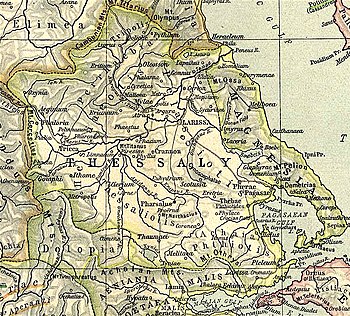- Rhizus may also refer to Ριζαίον on the Black Sea, modern Rize.
Rhizus or Rhizous (Greek: Ριζούς (ο)) was a town and polis[1] of Magnesia in ancient Thessaly, whose inhabitants were transported by Demetrios Poliorketes to Demetrias upon the foundation of the latter city.[2][3][4] We learn from Periplus of Pseudo-Scylax that Rhizus was outside the Pagasaean Gulf upon the exterior (Aegean) shore.[5] In Strabo's time, it was a village dependent on Demetrias.[2] Coins minted by Rhizus have been found, dated in the 4th century BCE.[6][7]

The site of Rhizus is at the modern village of Tarsanas (Ταρσανάς).[8][9][10]
References
edit- ^ Mogens Herman Hansen & Thomas Heine Nielsen (2004). "Thessaly and Adjacent Regions". An inventory of archaic and classical poleis. New York: Oxford University Press. p. 721. ISBN 0-19-814099-1.
- ^ a b Strabo. Geographica. Vol. 9.5.15, 9.5.22. Page numbers refer to those of Isaac Casaubon's edition.
- ^ Stephanus of Byzantium. Ethnica. Vol. s.v.
- ^ Pliny. Naturalis Historia. Vol. 4.9.16.
- ^ Periplus of Pseudo-Scylax, p. 24.
- ^ Ancient Greek Coins from Rhizus
- ^ Rogers E., The Copper Coinage of Thessaly, London, 1932, pp. 169, 170
- ^ Richard Talbert, ed. (2000). Barrington Atlas of the Greek and Roman World. Princeton University Press. p. 55, and directory notes accompanying. ISBN 978-0-691-03169-9.
- ^ Lund University. Digital Atlas of the Roman Empire.
- ^ Fossey, J., J. Morin (14 January 2021). "Places: 541085 (Rhizous)". Pleiades. Retrieved January 14, 2021.
{{cite web}}: CS1 maint: multiple names: authors list (link)
This article incorporates text from a publication now in the public domain: Smith, William, ed. (1854–1857). "Rhizus". Dictionary of Greek and Roman Geography. London: John Murray.
External links
edit39°46′41″N 22°49′29″E / 39.77812°N 22.82485°E